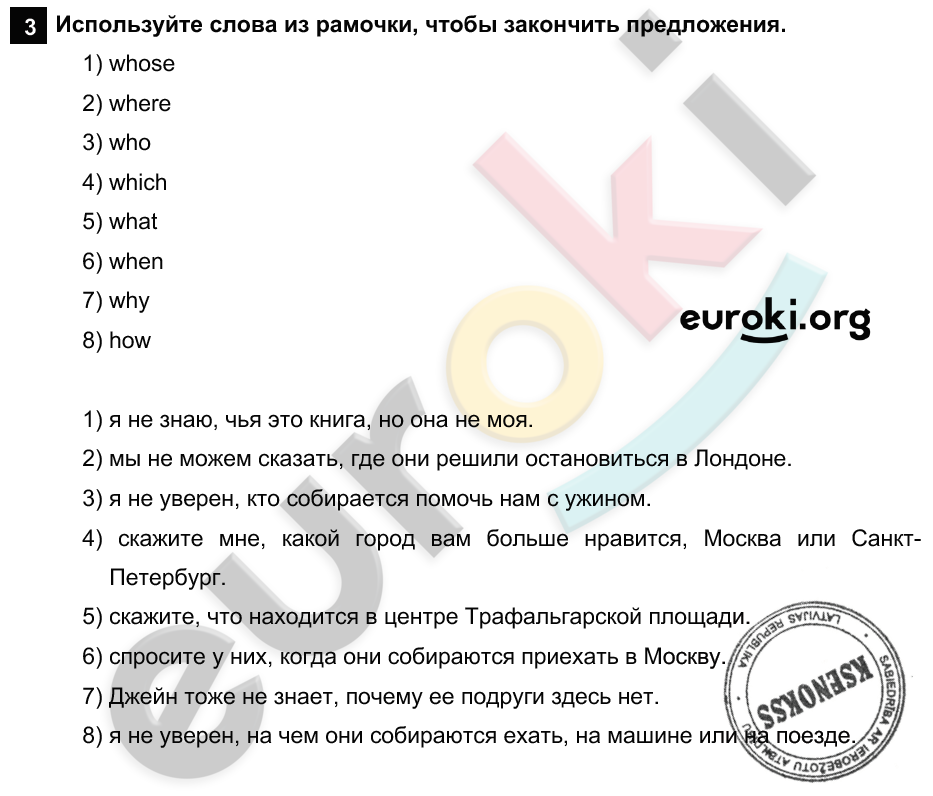Решение упражнения
1) Yes, I willingly help my parents around the house by doing chores and tasks such as cleaning, cooking, and taking care of my younger siblings. I also help them with the shopping by accompanying them and carrying the bags. When it comes to family problems, I try my best to offer support and solutions. For my friends, I willingly listen to their problems and offer advice or assistance whenever I can.
2) My parents don’t always allow me to do whatever I want, but they do consider my opinions and give me some freedom to make my own choices. I don’t often ask them to allow me to do something unusual, as I understand their concerns and respect their decisions. When it comes to my future children, I believe in setting boundaries and guiding them towards responsible choices. There will be certain things I won’t allow them to do if it’s harmful or goes against their well-being.
3) I try not to refuse people when they ask for help, unless I have a valid reason or if it’s beyond my capabilities. However, there have been instances where I had to refuse due to prior commitments or personal limitations. My parents also sometimes refuse to do what I ask them, and I understand that they have their own reasons and limitations. As for my friends, they rarely refuse me, and I try my best not to refuse them unless necessary.
4) When people say “Hi, how are you?” I usually reply with a smile and say something like “I’m good, thank you. How about you?” I try to reply to questions politely and engage in conversation. However, if I’m busy or unable to respond immediately, I may not always reply right away. I prioritize responding to text messages, but there may be instances where I can’t reply immediately due to various reasons.
5) Being fair can be challenging, but I strive to be a fair person. I believe in treating others with equality and justice. However, I understand that fairness can be subjective, and what may seem fair to me might not be fair to others. I can’t speak for all my friends, but I believe most of them try to be fair as well. It’s important to consider different perspectives and circumstances when determining fairness.
6) I hold my schoolbag on my back when I go to school. I rarely ask people to hold my bag or other things for me, as I prefer to carry my own belongings. However, there may be situations where I need assistance, such as when my hands are full or if I’m unable to carry something due to physical limitations.
7) I generally feel safe in the place where I live, but like any other place, there can be occasional concerns. Stadiums can be safe places for spectators if proper security measures are in place. It is not safe to cross the street when the red light is on, but some people still do it due to impatience or disregard for traffic rules. People often don’t do what is safe due to various reasons such as ignorance, thrill-seeking behavior, or lack of awareness of potential risks.
Keys:
1. 1. on; 2. in; 3. at; 4. in; 5. on; 6. at; 7. on; 8. on; 9.
at; 10. in; 11. in/on; 12. on; 13. at
2. 1. in; 2. on; 3. in; 4. on; 5. at; 6. on; 7. in; 8. on; 9.
At; 10. on; 11. on; 12. at
3. 1. on; 2; in; 3. on; 4. At; 5. in; 6. at; 7. on; 8. on; 9.
At; 10. in; 11. in; 12. On; 13. At
4. 1. on; 2. in; 3. in; 4. on; 5. at; 6. at; 7. on; 8. in; 9.
in; 10. at; 11. on; 12. at; 13. in; 14. on; 15. at
5. 1. in; 2. On, On; 3. at; 4. in; 5. at; 6. on; 7. On; 8. in;
9. at; 10. at/in; 11. on; 12. in; 13. on; 14. at
6. 1. on, on; 2. in; 3. at; 4. in; 5. on; 6. at; 7. At; 8. on;
9. in; 10. on; 11. at; 12. at; 13. on; 14. in, in
7. 1. on; 2. in; 3. at; 4. On; 5. at; 6. On; 7. in; 8. at, at,
in; 9. On; 10. at; 11. on; 12. in; 13. on; 14. in; 15. on
8. 1. at; 2. in; 3. in; 4. at; 5. in; 6. at; 7. on; 8. in; 9.
at; 10. in, in; 11. at; 12. at/in; 13. in; 14. at/in; 15. in; 16. in; 17. at; 18. in;
19. in; 20. on; 21. in/at; 22. in; 23. at/in; 24. on
9. 1. At; 2. On; 3. in; 4. on; 5. at; 6. on; 7. In; 8. in, on;
9. in; 10. on; 11. in; 12. in/on; 13. in; 14. at
10. 1. in; 2. at/on; 3. on; 4. In; 5. at/on; 6. in; 7. on, in;
8. in; 9. in; 10. on/at; 11. On; 12. on, in; 13. on/at; 14. in
11. 1. In; 2. at; 3. on; 4. in; 5. on; 6. at; 7. In; 8. in; 9.
At; 10. in, on; 11. at; 12. in; 13. at
12. 1. at; 2. in; 3. at; 4. at; 5. in; 6. in; 7. at; 8. at; 9. in; 10. in; 11.
in; 12. in, at; 13. at; 14. in; 15. in, in; 16. in; 17. at; 18. at; 19. at
Описание задания и ответ[править | править код]
A. Choose the right words ot complete the sentences.
- I’m rather hungry, I’d like to go to the buffet during the interval.
- The family visited a number of nice places during the summer.
- Norman didn’t write to me for a long time. I thought he had forgotten me.
- They met during the war and have been together ever since.
- My friend speaks fluent English; he lived in the US for six months last year.
- It snowed heavily during the night and by the morning the world had changed.
- I’m sorry, I’m very busy this morning and can see you only for a few minutes.
- We have been living here for six years.
- During the war the country was occupied by the enemy troops for a few months.
- Mike stayed in London for a week. During that time he did most of the sights of the great city.
B. Use in or on to complete the sentences.
- I hope the letter will be typed in time to be sent with the messenger.
- I nearly lost my way but asked a passerby for directions and arrived in time.
- The ambulance arrived in time and the injured driver was immediately rushed to the hospital.
- Jane is very punctual and always comes on time. I think she has never been late in her whole life.
- Oh good! You’re just in time for tea!
- All the guests have already registered. I think that the conference will begin on time.
- We came home in time for the beginning of the nine o’clock news.
- Look at the time! We are going to be late and I promised to come on time.
- The train arrived on time and we came to the hotel ten minutes before the beginning of the reception.
- We hoped to return in time for mother’s birthday to take her by surprise.
C. Use at or in to complete the sentences.
- Do you see that tall tower at the end of the street?
- You are going on holiday at the end of this month, aren’t you?
- Jack was not so sure if he should buy such an expensive car. At the end, he decided not to.
- At the end of the war, the government made many promises for a better future.
- They argued a lot about the project and in the end, he won.
- I know it took you long to make up your mind. What did you decide in the end?
- The meeting will be held at the end of the week.
- We looked everywhere and, in the end, we found the key.
- The most exciting events began at the end of the novel.
- The main characters lost sight of each other for a long time but in the end, they met and never parted again.
D. Use in or on (where necessary) to complete the sentences.
- 1. I’ve got a job interview Thursday afternoon.
- 2. What are you doing tomorrow evening?
- 3. I might go shopping this evening.
- 4. Perhaps we can meet at the afternoon.
- 5. I’ll see you on Wednesday morning.
- 6. I’m so tired in the evenings, all I want to do is to sit and watch television.
- 7. Police say the incident took place at around 9 o’clock on yesterday evening.
- 8. On a warm summer morning we began our journey and were soon out of the city.
- 9. On the morning of her birthday, Jane woke up early and started planning the day ahead.
- 10. I prefer to do my shopping in the afternoon when the shops are not so crowded.
E. Use after or afterwards to complete the sentences.
- It’s not surprising that the players feel dead tired after the play.
- I didn’t see her again until a few days afterwards.
- I found the key only after you had left the house.
- After the party we felt too excited to go to bed.
- I soon forgot the accident and never remembered it afterwards.
- After we watched the film, we decided to read the book it was based on.
- You don’t have to complete the work now. You can do it afterwards.
- Let’s go and see the film, and afterwards we could go for a meal.
- Don’t worry, you can book the tickets now and pay for them afterwards.
- There was plenty of food left after the meal, we packed it and took it to the country house to eat afterwards.





























